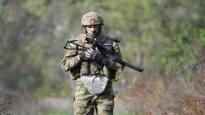The harsh truth was only revealed on the spot.
This is what a 27-year-old professional soldier says Dmitry Vasilets of Russian independent media Novaja Gazeta (you switch to another service) in the interview.
Vasilets was one of the first to be sent to the front when Russia started a war of aggression in Ukraine in February.
According to his own words, Vasilets did not participate in the killing, but worked at the headquarters of the Russian Armed Forces.
The first lieutenant spent five months at the front, but then the measure was full. Vasilets tried to resign from the service of the Russian army, but it turned out to be impossible.
In August, during his vacation, he announced that he would no longer return to the front. Now he is charged with disobedience, and could face up to three years in prison.
– I know I’m going to jail. I made my choice, he tells Novaja Gazeta.
Independent news media have also reported on Vasilets’ story Meduza (you will switch to another service). has not been able to independently confirm Vasilets’ claims.
Open criticism of Russian soldiers towards Russia’s war in Ukraine is rare.
Vasilets’ case is also exceptional because a Russian court has yet to convict a person with a military rank of first lieutenant since the country tightened the law on civil disobedience at the end of September.
By the end of December Russia has condemned (you switch to another service) only one soldier is known to have been imprisoned for insubordination in the army.
Many thought the command was peaceful
In February, Russia announced that it would start a “special operation” in Ukraine. At the beginning of the war, Russia sent only professional soldiers to the front.
Vasilets received a command letter saying that he was to take part in military exercises.
He says that he thought, like many of his colleagues, that the “special operation” would be “peaceful, like on the Crimean peninsula in 2014”.
In February 2014, Russia brought its special forces to Crimea to secure a fraudulent referendum in which it was decided to annex Crimea to Russia.
– The fights came as a shock to me. At first, it was an unreal feeling, as if you were in a game or a movie, says Vasilets.
Only when Vasilets realized that he was on the front line in the middle of the fighting did he begin to question Russia’s actions.
Anxiety and self-loathing tormented me
Vasilets says in an interview with Novaya Gazeta that he constantly experienced enormous anxiety because he knew people were dying at the front.
After three months, the anxiety stopped, and darkness took over the mind. Vasilets estimates that he is burnt out both mentally and physically.
During the first months of the war, Ukraine constantly fired at the headquarters where Vasilets worked. Two colleagues of Vasilets, who were also his close friends, died in the shooting.
Vasilets says he regrets not deciding to leave the armed forces immediately after his colleagues died.
After the deaths, suicidal thoughts began to take over the first lieutenant’s mind.
– I no longer wore a bulletproof vest and I didn’t care if I was the 200th or 300th to die, he says.
Vasilets admits that the death of friends fueled anger towards Ukrainian soldiers. At the same time, however, he hated himself and the whole situation.
Russia wants more soldiers to the front
In September, Vasilets learned that the temporary contracts of the professional soldiers had been changed to permanent ones. At the same time, Russia tightened its war crimes legislation.
In September, Russia also started a partial mobilization, during which around 300,000 reservists were called up for service. At the same time, the President Vladimir Putin the rhetoric about the war has changed.
Recently, Putin has been seen making more and more appearances with the commanders of the armed forces, visiting weapons factories and training centers. Recently, Putin called the situation in Ukraine a war for the first time.
American think tank Institute for the Study of War (you move to another service) reported at the end of November on Ukraine’s estimate that Russia would need up to five million soldiers to deal with Ukraine.
ISW considers recruiting such a number of soldiers an impossible task for Russia. Calling up 300,000 reservists alone has been a huge effort for Russia (you switch to another service)which has led to widespread criticism and an unprecedented brain drain from Russia.
The launch is closely followed by a Russian supplier Ian Matveev rate the German Deutsche Wellen (you switch to another service) in an interview in December, that Russia’s military losses are high and that is why Russia needs new soldiers to the front constantly.
He also points out that at no point has Putin officially signed an order to stop the campaign.
Under Christmas, the Minister of Defense Sergei Shoigu announced that Russia plans to increase the manpower of its armed forces to 1.5 million.
Invitation letters are therefore still being distributed in Russia at the moment.
See also:
Ulkolinja documentary from 2014, which sheds light on the background of the war in Ukraine
